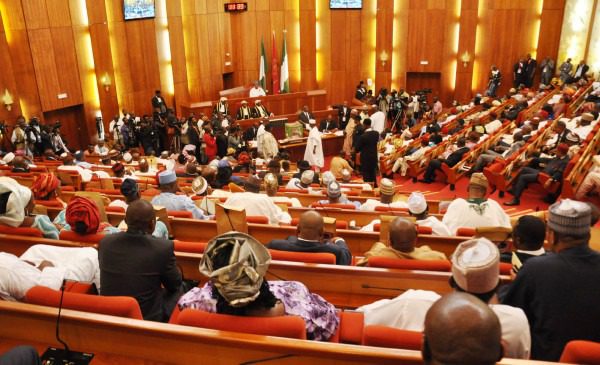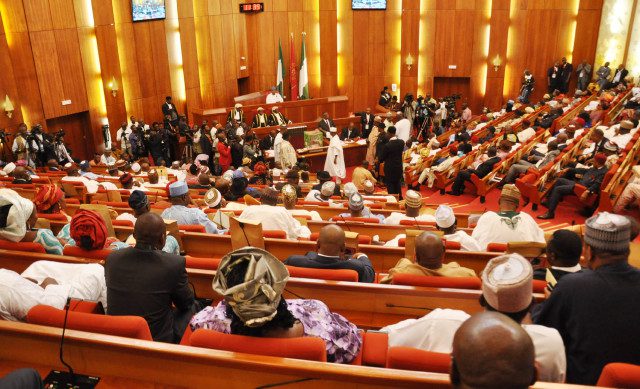Democracy & Governance
Constitutional Reform: Let Nigerians Have a Voice -By Freke Ette


The ongoing attempt to amend the 1999 Constitution reveals Nigeria’s constitutional immaturity. Were lawmakers’ acting from ignorance, we would merely shake our heads in ridicule. Yet by their actions, our legislators unmask their dishonest motivations. The citizens are frozen out of the political process. They sit, as supine bystanders and hapless toddlers, while nannies make the difficult decisions. In a short-sighted pursuit of political gain, the political elite risk derailing our embryonic democratic experiment.
There are at least three reasons why the amendment effort is detrimental to the polity. First of all, the national assembly is the improper body to amend the constitution. Secondly, Nigerians, or possibly Nigerians through their states, are the right subjects for the task. Thirdly, given that most Nigerian political actors champion federalism, the present means used to achieve it are inadequate and counterproductive. One cannot decrease the authority of the federal government or return power to the subnational level with edicts delivered from Abuja.
After reading the Senate President’s speech at the constitutional review retreat, it seems our lawmakers see no difference between legislation and the constitution. This distinction matters because it identifies those actions that can be done in the name of the Nigerian people. Before Nigeria can confidently grow into her own as a democratic state, it is crucial her citizens are educated about their rights, duties and aspirations. At the same time, they must be made aware of the limits of representation.
Legislation refers to the daily tasks that power the engine of government. Here is lawmaking at its most elementary, with bills sponsored, examined and passed. Observers evaluate the government’s vigour by the vitality of the legislative process. Partisan intrigue, diabolical machinations and unsavoury compromises are the stock-in-trade of the craft. In a truly functional system, lawmakers and other elected officers are judged by their votes. A vigilant populace identifies its desires, instructs its legislators and enforces its will at the ballot box, either by rewarding the dutiful or punishing the errant.
The constitution, on the other hand, is the decision made by a unified people on what form of political entity they want. This edifice–it must be considered as more than a document—is too magnificent to have a few persons apply cursory make-up to it. If Nigeria’s political status changes, it requires a decision by the people in the form of a ratification process, not a vote by members of a chamber. When legislators become constitutional guardians, the constitution transforms into the plaything of any political party that possesses a majority. Such uncertainty is neither conducive to the country nor suggestive of a mature state. Endless tinkering and shape-shifting solidifies a rule of experts famed for their lack of expertise.
Our Constitution is clear on the procedure for amendments, yet if the entire work undergoes a comprehensive check-up, there is no reason why that relevant section is sacrosanct. By acting as the final arbiters of the constitutional process, the people as pouvoir constituant are banished from the political sphere. Indeed when the Honourable Senate President declares that the National Assembly’s work is “the surest way of delivering to our people a more acceptable constitution,” we must ask how the statement corresponds with the Preamble, which states, “We, the People of the Federal Republic of Nigeria…do hereby make, enact and give to ourselves the following Constitution.” How can legislators give Nigerians what is already theirs?
The people are the purveyors of the constitution. Since the people know what they want, there is less room for error. Even if there is a decision that proves inimical to the polity, it is one they have decided to live it. Nigerians will not take the responsibility to amend lightly because as there are few occasions when they leave their private roles as individuals and become citizens. For this reason, the calls to implement the CONFAB report, while well-meaning, are actually nonsensical. The people did not have an input into the proposals, never decided the issues on its merits or settled them through a decision.
The resources required to gather the people, educate them about the issues and influence public opinion is such that frivolous questions are rendered irrelevant. If immunity, pensions, presidential assent and electoral age restrictions are so crucial to the functioning of the polity, let these questions be tested through public opinion. Organise town hall discussions across the country where interlocutors apply the intense gleam of reason in a public forum.
It is duplicitous to claim that Nigeria needs restructuring as a federal state and then begin the process in Abuja. The signal is garbled. On one hand, we hear there is too much power at the federal level. On the other hand, we are assured only federal legislators can deliver us from this quandary.
Even though, federalism is fraught with uncertainty and risk, political autonomy is agnostic toward the potential for failure and the prospect of great success. Hence, while a first step to initiate federalism is to have the people decide, it is paramount the people of each state decide. Every state has its own interests, conflicts and essence, be they ethnic, geographical, economic or religious. Let these all come to play when important questions about the nation are decided, rather than be hidden by partisan skullduggery and arcane chamber rules.
The goal is clear: A more federal system. By excluding the people, the lawmakers mock the constitutional process. They not only cannot reach the proposed end of a vigorous, healthy republic, but their behaviour subvert it. When it comes to amending the constitution, we might make unexpected decisions. Our representatives, however, will always make the wrong ones. If lawmakers were angels, we would give them the authority to perform these amendments. Alas, that is not the case.
Freke Ette is a doctoral candidate in political theory, whose research looks at the people’s political role in modern constitutions.



















